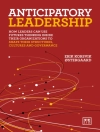The urgent and sustained interest in corporate governance is unprecedented, with the connections between corporate governance and economic performance being emphasized by the World Bank, the
IMF and others in the global economic community.
In this timely and definitive intellectual analysis of a key discipline, The SAGE Handbook of Corporate Governance offers a critical overview of the key themes, theoretical controversies, current research and emerging concepts that frame the field. Consisting of original substantive chapters by leading international scholars, and examining corporate governance from an inter-disciplinary basis, the text highlights how governance issues are critical to the formation, growth, financing, structural development, and strategic direction of companies and how corporate governance institutions in turn influence the
innovation and development of industrial and economic systems globally.
Comprehensive, authoritative and presented in a highly-accessible framework, this Handbook is a significant resource to those with an interest in understanding this important emerging field.
Table des matières
Preface – Sir Adrian Cadbury
Introduction: Corporate Governance – An Emerging Discipline? – Thomas Clarke and Douglas Branson
PART ONE: ORIGINS AND DEVELOPMENT
The Evolution of Corporate Governance – R.I. (Bob) Tricker
In the Best Interest of the Corporation: Directors Duties in the Wake of the Global Financial Crisis – Margaret M. Blair
Limited Liability Companies – Mark J. Loewenstein
Theoretical and Methodological Perspectives – Joan Mac Leod Heminway
PART TWO: MARKETS AND REGULATION
The Juridical Nature of the Firm – Simon Deakin
The Ascent of Shareholder Monitoring and Strategic Partnering: The Dual Functions of the Corporate Board – Michael Useem
An Economic Analysis of Fair Value: A Critique of International Financial Reporting Standards – Vincent Bignon, Yuri Biondi and Xavier Ragot
PART THREE: BOARDS AND DIRECTORS: LEADERSHIP AND ACCOUNTABILITY
Boards and Board Effectiveness – Hans van Ees and Gerwin van der Laan
Between the Letter and the Spirit: Defensive and Extensive Modes of Compliance with the UK Code of Corporate Governance – John Roberts
Boards′ Contribution to Strategy and Innovation – Alessandro Zattoni and Amedeo Pugliese
Board Leadership and Value Creation: An Extended Team Production Approach – Morten Huse and Jonas Gabrielsson
PART FOUR: BOARDS AND DIRECTORS: NEW CHALLENGES AND DIRECTIONS
Changing Scenes in and around the Boardroom: UK Corporate Governance in Practice from 1989 to 2010 – Annie Pye, Szymon Kaczmarek and Satomi Kimino
Board Evaluations: Contemporary Thinking and Practice – Gavin Nicholson, Geoffrey Kiel and Jennifer Ann Tunny
Women and the Governance of Corporate Boards – Ruth Sealy and Sue Vinnicombe
Diversity among Senior Executives and Board Directors – Sabina Nielsen
PART FIVE: COMPETING GOVERNANCE REGIMES
Global Convergence in Corporate Governance: What a Difference 10 Years Make – Douglas M. Branson
A Bundle Perspective to Comparative Corporate Governance – Ruth V. Aguilera, Kurt Desender and Luiz Ricardo Kabbach de Castro
Family-Owned Asian Business Groups and Corporate Governance – Marie dela Rama
The Limitations of Corporate Governance Best Practices – Shann Turnbull
PART SIX: DILEMMAS OF CORPORATE GOVERNANCE
Executive Compensation, Pay-for-Performance and the Institutions of Executive Pay Setting – Martin J. Conyon and Simon I. Peck
In the Name of Shareholder Value: How Executive Pay and Stock Buybacks are Damaging the US Economy – William Lazonick
Governance, Innovation and Finance – Ciaran Driver
The Governance and Regulation of Complex Conglomerates – John H. Farrar
PART SEVEN: EMERGING ISSUES: GOVERNANCE AND SUSTAINABILITY
Markets, Regulation and Governance: The Causes of the Global Financial Crisis – Thomas Clarke
Corporate Governance and the Financial Crisis: The Regulatory Response – Alice Klettner
International Corporate Responsibility – Paul Redmond
Governance for Sustainability: Challenges for Theory and Practice – Suzanne Benn
A propos de l’auteur
Professor Thomas Clarke is a Fellow of the Royal Society of Arts (FRSA) and international corporate governance expert. He is a former editor for governance and sustainability of the Journal of Business Ethics a FTSE 50 journal. He is the editor of The Sage Handbook of Corporate Governance, and an editor of The Oxford Handbook of the Corporation. He is editor of the Cambridge University Elements in Corporate Governance book series which features works on corporate purpose and sustainability. He contributed to the formulation of the OECD Principles of Corporate Governance (1999). He conducted the 2012 Census of Women in Leadership for the Australian Government, launched by Governor-General Quentin Bryce. He is the Inaugural Sir Adrian Cadbury Scholar of the International Corporate Governance Network (ICGN) that represents $54 trillion institutional investor funds. His current research interests include the pivot towards corporate sustainability including integrating targets and measures, progress towards decarbonisation, and the circular economy. He conducted pioneering research on cooperative enterprise at Warwick University and later published the first critical works on the process of privatization at St Andrews University in the UK. He was awarded the first funded chair in Corporate Governance at Leeds Business School in 1992, and became a foundation Professor of Management at the China Europe International Business School (CEIBS) in Shanghai, a joint venture of the European Foundation for Management Development (EFMD) and Shanghai Jia Tong University. He taught on Institute of Director programs in the UK and contributed to the development of AICD programs in Australia where he is Emeritus Professor at UTS Sydney. He has held Visiting Professorships at the University of Paris, Dauphine; University of Toulouse and ESC Lille, France; University of Geneva, Switzerland; FGV Business School, Sao Paulo, Brazil; and UAM Business School, Mexico City.











